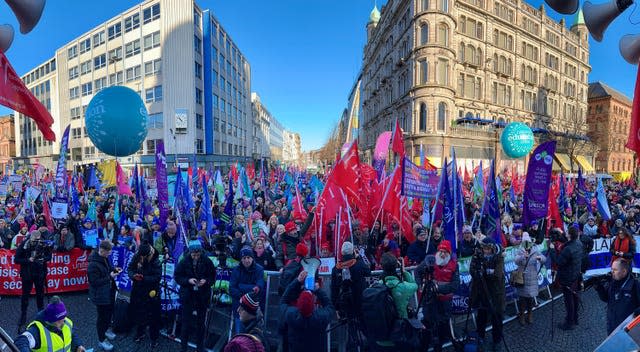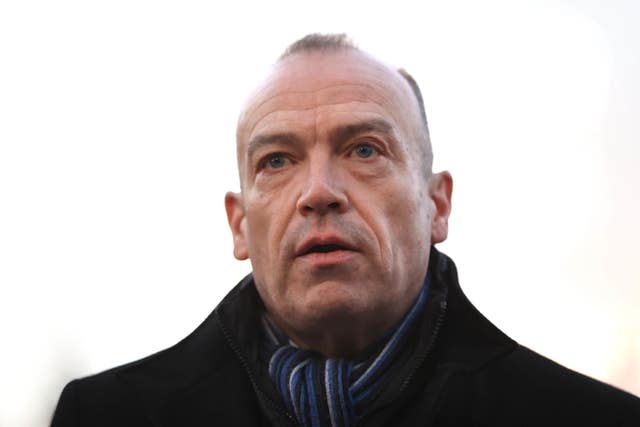Senior DUP members discuss whether to back a Stormont return
Senior DUP figures have held discussions on potentially ending their Stormont boycott but party sources downplayed the prospects of a final decision emerging on Friday.
The calling of the party officers meeting came amid mounting speculation that the DUP is preparing to make a call on whether or not to accept a Government deal on post-Brexit trading arrangements.
Downing Street expressed hope the Stormont impasse could soon be resolved while Irish premier Leo Varadkar described the meeting as a “positive sign”.
The devolved institutions at Stormont have been collapsed for almost two years as a result of a DUP boycott in protest at the Brexit-linked economic barriers on trade between Great Britain and Northern Ireland.

Senior civil servants are running devolved departments, with limited powers, in the absence of local ministers.
Northern Ireland Secretary Chris Heaton-Harris said before Christmas that his negotiations with the DUP over the terms of the Windsor Framework – the UK/EU accord that governs GB/NI trade – had concluded.
Although the party has been holding out since then for more clarification on the Government’s proposals, it appears to be approaching the juncture when it decides whether to reject or accept the deal that would end the powersharing deadlock.
One senior DUP source said: “It is clear that the time for a decision has arrived. The negotiation is over.”
Any proposed return to Stormont would be expected to be strongly opposed by some of the DUP’s 12 party officers who have made clear that devolution should only be restored when all of their concerns over the Irish Sea trading border have been addressed.
The officer board includes senior figures such as party leader Sir Jeffrey Donaldson, deputy leader Gavin Robinson, senior peer Lord Dodds and longstanding MPs Sammy Wilson and Gregory Campbell.
A DUP spokesman declined to comment on the meeting, insisting he would not give a running commentary on internal party affairs.
In a statement on Friday evening, the spokesman said: “We understand that there has been considerable interest in our meeting today.
“We will not give a running commentary on our position, save to say, we will continue to engage with the Government.”
Expectations had been raised before Christmas that the DUP could be poised to return to powersharing, but it did not materialise.
The Government has offered a £3.3 billion package to stabilise Northern Ireland’s finances, including £600 million to settle public sector pay claims in Northern Ireland.

However, Mr Heaton-Harris has made clear that the funds can only be released when the powersharing institutions return.
Thousands of public sector workers took part in strike action on Thursday, where calls were made for Mr Heaton-Harris to release the funds for pay claims and for the DUP to return to Stormont.
On Thursday, a legislative deadline passed for the restoration of the Stormont Assembly.
As a result, any imminent return of the Assembly would first require new legislation to be tabled at Westminster.
A No 10 spokeswoman said she would not speculate on political party meetings.
“Our focus has always been on delivering for the people of Northern Ireland who rightly expect locally elected decision-makers to address the issues that matter to them,” she added.
“We also think we have a strong basis for the restoration of powersharing, so we hope this can be fixed soon.”

Amid warnings earlier this week that the Stormont Assembly may not return for some time, former Northern Ireland secretary Julian Smith said on social media: “Sometimes it’s darkest before the dawn.”
Taoiseach Mr Varadkar said Friday’s meeting was a “positive sign”.
He added: “We’ll be very keen to see the Assembly and executive up and running again and certainly our role, as the Irish Government, will be to do everything we can to make sure that it is sustainable, that it is successful.
“There are very serious issues that have to be dealt with in Northern Ireland, from public sector pay to the health service, to other issues.
“If it is the case that the executive and the Assembly can be re-established, we want to make sure that it’s sustainable and successful and we’re willing to work with the British Government and all the major parties in the north on exactly that.”
However, he said he was not aware of any changes to the Windsor Framework, and that any changes would have to be made by the EU and the UK.


